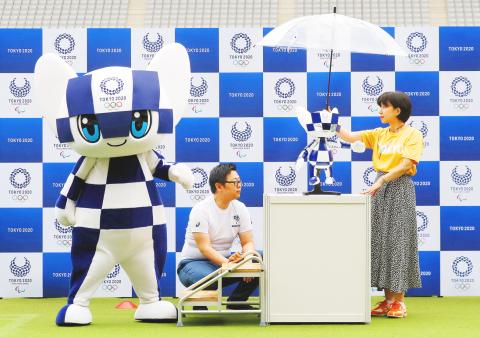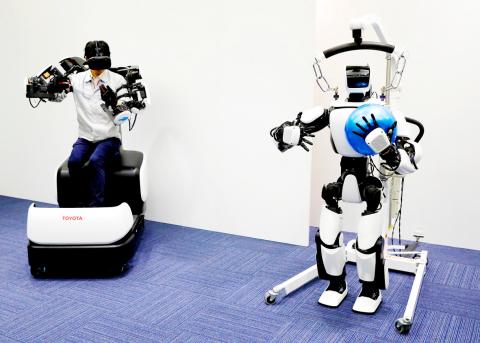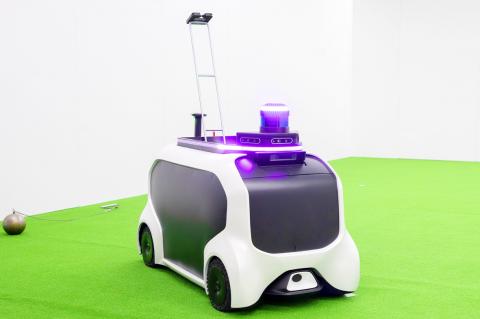Miniature remote-controlled cars have proved to be a crowd pleaser at track and field throwing events, but for the Tokyo 2020 Olympics Toyota Motor Corp is upping the game with a high-tech way to fetch javelins and hammers: pint-sized, self-driving artificial intelligence (AI) robot cars.
The Japanese automaker yesterday unveiled a prototype of its next-generation field support robot, a miniature shuttle bus-shaped contraption based on its “e-Palette” ride-sharing vehicle under development, to be used at the Tokyo Games.
The vehicle, about the size of a toddler’s ride-on toy car, can travel at a maximum speed of 20kph and sports three cameras and one lidar sensor, which enable it to “see” its surroundings.

Photo: EPA-EFE
Draped around the top of its body is a band of LED lights which illuminate when the vehicle uses artificial intelligence to follow event officials toward the equipment hurled by athletes onto the pitch during shot put, discus throw, hammer throw and javelin events.
After the equipment, which can weigh as much as 8kg for hammers, is loaded into the vehicle by the official, a press of a button located toward its front sends the car zipping back to athletes for later use.
“Humans are better suited to picking up heavy equipment from the field, but for quickly transporting them to their respective return depots, that’s a job that’s best performed by robots,” Takeshi Kuwabara, a project planning manager who oversaw the robot’s development, told reporters. “Our aim was to leverage the strengths of both humans and robots.”

Photo: Reuters
The trend of using miniature cars to fetch equipment at Olympics throwing events goes back to the 2008 Beijing Games, where firey-red, rocket-shaped cars scurried along the green to collect hammers, javelins and discuses.
At the 2012 Games in London, BMW operated a fleet of blue and orange miniature Mini Coopers to collect the discarded equipment, while pint-sized green pick-up trucks performed the task at the Rio games in 2016.
A major sponsor of the Tokyo Games, Toyota also plans to dispatch virtual-reality enabled humanoid robots and mobile telepresence robots, which will enable spectators who cannot attend the games in person to experience events and meet athletes remotely.

Photo: Bloomberg
A fleet of robots on wheels that can perform household tasks for elderly people and hospital patients are to guide guests to wheelchair seats and serve refreshments at events.
Toyota plans to use the games to showcase its new vehicle technologies ranging from fuel-cell buses to on-demand, self-driving taxis.

GROWING OWINGS: While Luxembourg and China swapped the top three spots, the US continued to be the largest exposure for Taiwan for the 41st consecutive quarter The US remained the largest debtor nation to Taiwan’s banking sector for the 41st consecutive quarter at the end of September, after local banks’ exposure to the US market rose more than 2 percent from three months earlier, the central bank said. Exposure to the US increased to US$198.896 billion, up US$4.026 billion, or 2.07 percent, from US$194.87 billion in the previous quarter, data released by the central bank showed on Friday. Of the increase, about US$1.4 billion came from banks’ investments in securitized products and interbank loans in the US, while another US$2.6 billion stemmed from trust assets, including mutual funds,

AI TALENT: No financial details were released about the deal, in which top Groq executives, including its CEO, would join Nvidia to help advance the technology Nvidia Corp has agreed to a licensing deal with artificial intelligence (AI) start-up Groq, furthering its investments in companies connected to the AI boom and gaining the right to add a new type of technology to its products. The world’s largest publicly traded company has paid for the right to use Groq’s technology and is to integrate its chip design into future products. Some of the start-up’s executives are leaving to join Nvidia to help with that effort, the companies said. Groq would continue as an independent company with a new chief executive, it said on Wednesday in a post on its Web

JOINT EFFORTS: MediaTek would partner with Denso to develop custom chips to support the car-part specialist company’s driver-assist systems in an expanding market MediaTek Inc (聯發科), the world’s largest mobile phone chip designer, yesterday said it is working closely with Japan’s Denso Corp to build a custom automotive system-on-chip (SoC) solution tailored for advanced driver-assistance systems and cockpit systems, adding another customer to its new application-specific IC (ASIC) business. This effort merges Denso’s automotive-grade safety expertise and deep vehicle integration with MediaTek’s technologies cultivated through the development of Media- Tek’s Dimensity AX, leveraging efficient, high-performance SoCs and artificial intelligence (AI) capabilities to offer a scalable, production-ready platform for next-generation driver assistance, the company said in a statement yesterday. “Through this collaboration, we are bringing two

Even as the US is embarked on a bitter rivalry with China over the deployment of artificial intelligence (AI), Chinese technology is quietly making inroads into the US market. Despite considerable geopolitical tensions, Chinese open-source AI models are winning over a growing number of programmers and companies in the US. These are different from the closed generative AI models that have become household names — ChatGPT-maker OpenAI or Google’s Gemini — whose inner workings are fiercely protected. In contrast, “open” models offered by many Chinese rivals, from Alibaba (阿里巴巴) to DeepSeek (深度求索), allow programmers to customize parts of the software to suit their